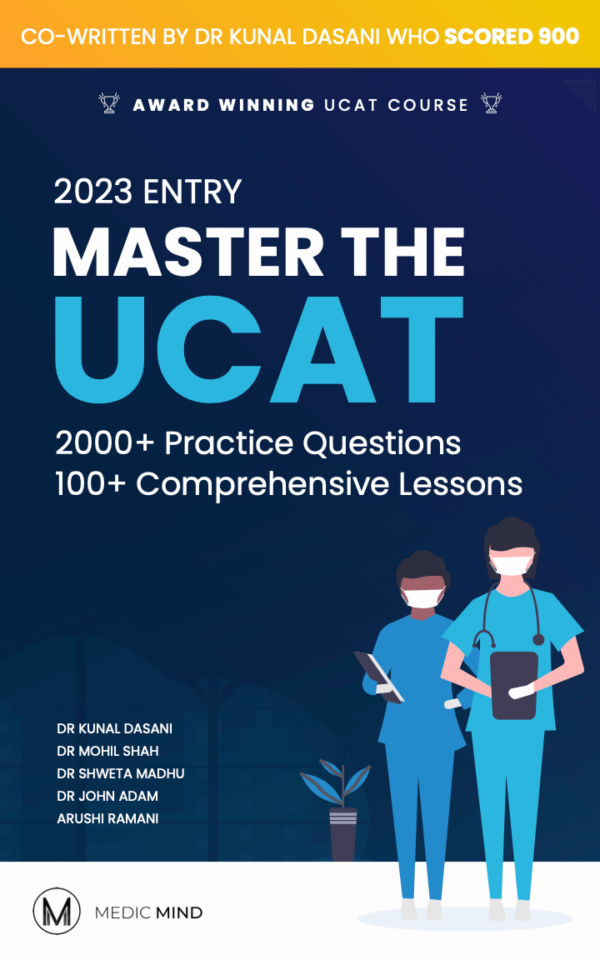Loading...

UCATSEN Situational Judgement
1. Identify your role
When reading the question, it will usually tell you who you are such as a medical student or a foundation year doctor. This is an important factor because it may change how you react in a situation, therefore determining which answer you choose. As a medical student, you are likely to have limited knowledge and resources so you may need to pick an answer that passes the responsibility to someone else. If the question states you’re a foundation year doctor, there are greater responsibilities you are expected to be able to tackle before escalating to your senior.

2. Identify key issues
Reading the GMC guidelines for Good Practice and learning the pillars of medical ethics can help you start to think more like a doctor and to identify issues within the scenario. Applying what you’ve read to the question can help in narrowing down the answer by considering what option best reflects what is expected of a competent doctor.
3. Don’t overthink it
Some of the options can seem very similar and all appear to be reasonable responses once you rule out the extremely inappropriate ones. Despite your extra time, try not to spend too much time overthinking and trying to decide between options. If you’re stuck between two options they are both likely to be good answers. You can still get partial points if you choose the second-best options.
4. Focus on key priorities
In a scenario, there are likely to be various factors to take into consideration. However, you want to focus on what needs to be prioritised so you can handle those other factors. When picking an option consider what is most urgent and likely to escalate if you don’t tackle it first.
5. Pace yourself
Situational Judgement is the final part of the UCATSEN and with your extra time, you will have been working for a long time. It’s likely that you will be quite tired by this point, but try to push through and remain focused so you can do as great in this section as you would have done in the earlier parts of the exam. Continue to remain focused and pace yourself so you can finish strong.
Frequently Asked Question
→What is UCATSEN Situational Judgement?
UCATSEN Situational Judgement is a section of the UCATSEN (formerly UKCAT) exam that assesses a candidate’s ability to make appropriate decisions in various real-life situations, such as those encountered in medical practice.
→How should I prepare for the UCATSEN Situational Judgement section?
To prepare for the UCATSEN Situational Judgement section, it is important to practice with sample questions and familiarize yourself with the format and structure of the exam. You can also review ethical principles and guidelines, as well as medical terminology and concepts.
→What types of questions can I expect in the UCATSEN Situational Judgement section?
The UCATSEN Situational Judgement section consists of a series of scenarios, each with multiple-choice questions. The questions are designed to test your ability to prioritize and make decisions in different situations, such as dealing with patients, colleagues, or ethical dilemmas.
→Can I retake the UCATSEN Situational Judgement section?
No, the UCATSEN exam can only be taken once per year, and the scores are valid for one year. If you are not satisfied with your score, you will need to wait until the next testing cycle to retake the exam.
→How does the UCATSEN Situational Judgement section differ from other sections of the UCATSEN exam?
The UCATSEN Situational Judgement section is unique in that it assesses a candidate’s ability to make practical decisions in various scenarios. The other sections of the UCATSEN exam focus on different skills and abilities, such as problem-solving, critical thinking, and mathematical reasoning.
→How important is the UCATSEN Situational Judgement section of the exam?
The UCATSEN Situational Judgement section is considered to be one of the most important sections of the exam. It assesses a candidate’s ability to apply their knowledge and skills to practical scenarios, which is essential for success in medical practice.
Useful Links
UCATSEN Articles
Support for the whole medical application process from UCAS application, UCAT/BMAT, personal statement, interview and more!
With over 1000 UCAT questions, mock paper walkthroughs and timing tips and advice
A unique opportunity to explore the world of healthcare through interactive simulations and real-life case studies. Run by senior physicians
Personalised private lessons, tailored to your UCAT needs





Was this article helpful?
Still got a question? Leave a comment
Leave a comment